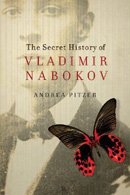Terror’s ghosts: Nabokov’s Pale Fire and the return from the Gulag
Heroes returning home in disguise have been around since the days of Homer. For just as long, these heroes have been recognized despite their masks. Coming back from the Trojan War dressed as a beggar, Odysseus found that his dog and childhood nurse could see through his deception. But what about events that transform survivors […]
Beautiful failures: Nabokov, Stalin, and the death of Hamlet
Stuck in the shadows of more accomplished, more loved siblings, lesser novels are often the bitter children of genius. They surrender family secrets and the details of their creators’ flawed parenting. Their failures provide their own intrigue. Such is the case with Bend Sinister, Vladimir Nabokov’s first novel written after his 1940 arrival in America. Revealing more authorial […]
Nabokov, metadata and civil liberties
“I wanted to be a famous spy.”—Humbert Humbert Vladimir Nabokov disdained most novels as “topical trash” and sought to create something transcendent in his own fiction. Yet topics dominating this month’s news about Edward Snowden—government surveillance, political intrigue, and spying—are oddly timeless when it comes to looking at Nabokov’s world. Growing up in the twilight […]
Nabokov, Feynman, and the names of trees
What do Richard Feynman, theoretical physicist, and Vladimir Nabokov, author of Lolita, have in common? For one, synesthesia—a blending of sensory input experienced by four percent of the population. Letters for Nabokov came paired with specific colors, and Feynman similarly reported seeing “light tan j’s, slightly violet-bluish n’s, and dark brown x’s flying around” in […]
Declassified documents and public records in The Secret History
What’s so secret about The Secret History? The most important history in the book is information that was once public knowledge but which has fallen out of public memory–Nabokov’s secret history as our forgotten past. But there is also some actual secret history in there: classified documents and public records that shed light on Nabokov’s life […]
Meet Carl Junghans: informer, propagandist, and… literary inspiration for Nabokov?
Vladimir Nabokov threw a Molotov cocktail into twentieth-century literature with Lolita. Alexander Solzhenitsyn survived Russian forced-labor camps and brought the word gulag into the global lexicon. Plenty of drama involving both of them appears in The Secret History, but as characters in the book they nonetheless faced competition from a lesser-known, scenery-chewing German named Carl […]
